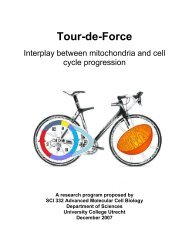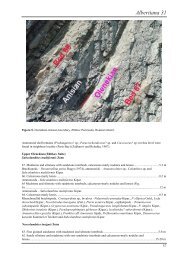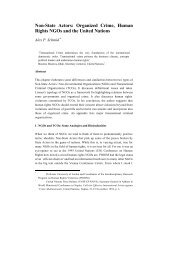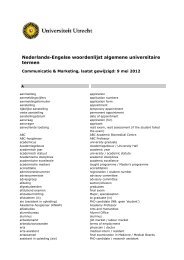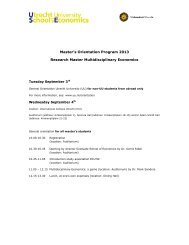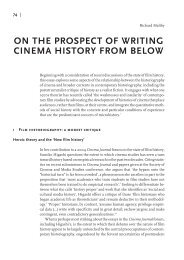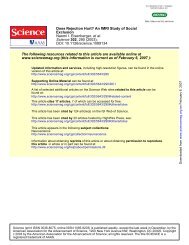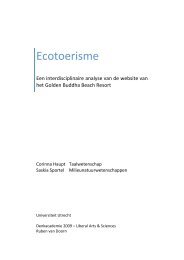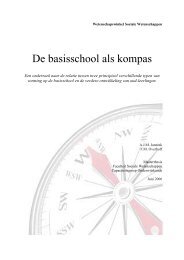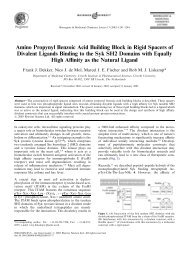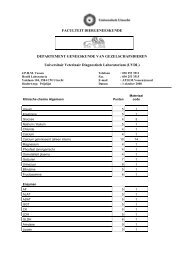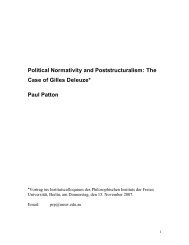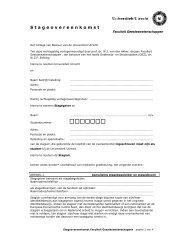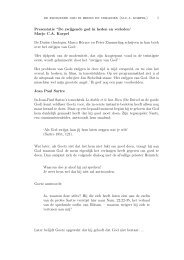Review of the Research Institute for History and - Universiteit Utrecht
Review of the Research Institute for History and - Universiteit Utrecht
Review of the Research Institute for History and - Universiteit Utrecht
Create successful ePaper yourself
Turn your PDF publications into a flip-book with our unique Google optimized e-Paper software.
University funding<br />
The University provides <strong>the</strong> following types <strong>of</strong> specifi c research funding, via <strong>the</strong> Faculty, or directly from <strong>the</strong><br />
University Board:<br />
a. Tenured faculty has a fi xed amount <strong>of</strong> nominal research time—30 % <strong>for</strong> assistant pr<strong>of</strong>essors, 40 % <strong>for</strong><br />
associate <strong>and</strong> full pr<strong>of</strong>essors—which is funded through <strong>the</strong> fi ve Teaching <strong>Institute</strong>s <strong>and</strong> <strong>the</strong>re<strong>for</strong>e not included<br />
in <strong>the</strong> OGC budget.<br />
b. OGC itself receives a lump sum from <strong>the</strong> Faculty <strong>of</strong> Arts. This lump sum covers such expenses as:<br />
• Salaries <strong>for</strong> PhDs<br />
• Management <strong>and</strong> management support<br />
• Travel abroad by all tenured <strong>and</strong> non-tenured faculty<br />
• Conferences <strong>and</strong> workshops organized under <strong>the</strong> aegis <strong>of</strong> OGC<br />
• Operational costs (<strong>for</strong> PhD students, postdocs <strong>and</strong> management), such as computers<br />
In 2004, a redistribution <strong>of</strong> <strong>the</strong> research funds from <strong>the</strong> Faculty <strong>of</strong> Arts between <strong>the</strong> two research institutes<br />
was decided on, which was favourable <strong>for</strong> OGC.<br />
c. By special arrangement, additional fi nancing is available <strong>for</strong> each successful dissertation defence in <strong>the</strong><br />
International PhD programme. This money is used to provide grants <strong>for</strong> particular international PhD-students,<br />
who are not employees <strong>of</strong> <strong>the</strong> university, but have student status, <strong>and</strong> in fact fund <strong>the</strong>mselves through<br />
<strong>the</strong> successful completion <strong>of</strong> <strong>the</strong>ir dissertations.<br />
d. The University Board provides additional specifi c funding <strong>for</strong>:<br />
• Special projects (Scenarios <strong>for</strong> <strong>the</strong> Humanities/BINT)<br />
• Matching NWO projects in <strong>the</strong> VeniVidiVici-programme<br />
• Royal Academy <strong>of</strong> Sciences Fellowships<br />
• Grotius fellowships<br />
• Infrastructure (or Penvoerderschapsgelden in Dutch) <strong>for</strong> three National <strong>Research</strong> Schools <strong>of</strong>fi cially administered<br />
in <strong>Utrecht</strong> <strong>and</strong> connected to OGC: those <strong>for</strong> Art <strong>History</strong>, Literary Studies <strong>and</strong> Gender Studies.<br />
Governmental <strong>and</strong> public funding<br />
NWO is <strong>the</strong> major science funding organization <strong>for</strong> <strong>the</strong> humanities in <strong>the</strong> Ne<strong>the</strong>rl<strong>and</strong>s. EU funding is<br />
included under this heading because it also comes from government sources <strong>and</strong> is given under similar conditions.<br />
In <strong>the</strong> period under review NWO provided research funding <strong>for</strong> 49 PhD-students, 48 Postdocs, <strong>and</strong> 16<br />
faculty (see Table B.12). This included:<br />
• Individual Postdoc projects<br />
• Projects in <strong>the</strong> VeniVidiVici-programme<br />
• Programmatic research<br />
• Projects in <strong>the</strong> Flemish/Dutch programme<br />
Projects in <strong>the</strong> “Trans<strong>for</strong>mation in Art <strong>and</strong> Culture” <strong>and</strong> “Cultural Change <strong>and</strong> Foundations <strong>of</strong> <strong>the</strong><br />
Humanities” programmes<br />
• Special funding, mainly Aspasia <strong>and</strong> so called Van der Leeuw-chairs<br />
• Digitalisation projects<br />
• International collaboration projects<br />
• Travel-grants <strong>for</strong> Postdocs <strong>and</strong> PhD-students<br />
• Funding <strong>for</strong> translations<br />
In <strong>the</strong> period under review European funding was provided through:<br />
• Fifth Framework<br />
• Sixth Framework<br />
• Marie Curie Programme<br />
• European Science Foundation<br />
OGC <strong>Research</strong> <strong>Institute</strong> <strong>for</strong> <strong>History</strong> <strong>and</strong> Culture<br />
370



